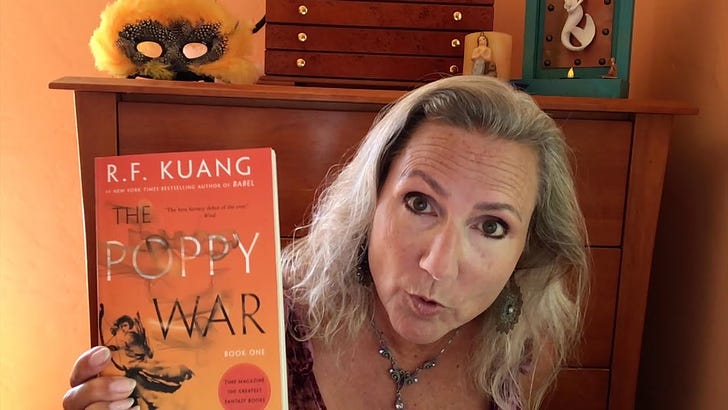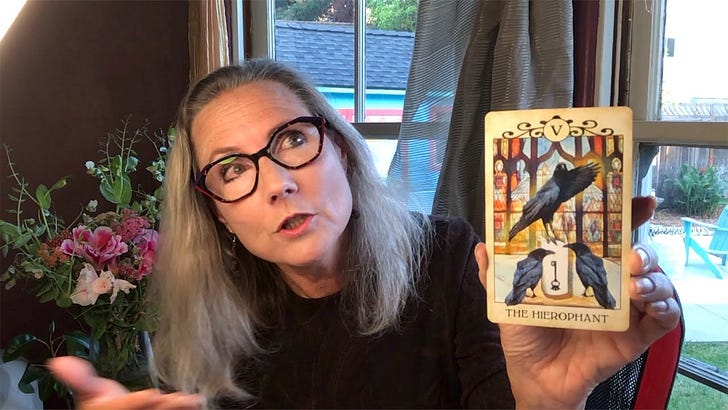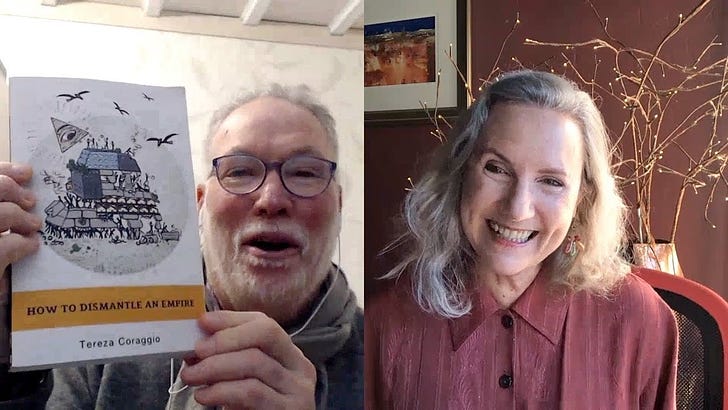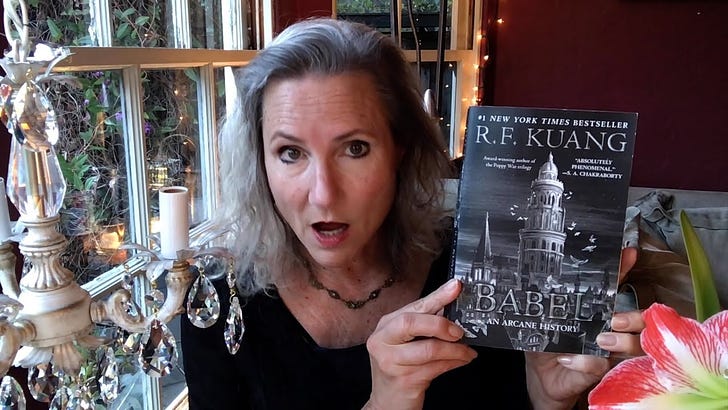In this episode, I look at Rebecca F Kuang’s three volume series on The Poppy War, The Dragon Republic and The Burning God. These are 1900 pages in the genre of sci fi but as dark and gritty as that genre gets with Chinese history lurking beneath a thin veneer of fantasy. And I mean very thin.
At the same time, I’ve been reading Fadi Lama’s Why the West Can’t Win. Fadi’s geoeconomics primer also covers some Chinese history. His chapter called Free World Values begins with the puppet state of Manchukuo from 1937-1945 after Japan captured Manchuria from China. Nobusuke Kishi, grandfather to Shinzō Abe, got his start as the Monster of Shōwa, which is really the Monster of Manchukuo. This is as gruesome as history gets.
It wasn’t until writing this article including both that I looked up the time-period for The Poppy War trilogy. It was inspired by the Second Sino-Japanese War from 1937 to 1945, known in China as the War Against Japanese Aggression. It starts with the Japanese invasion of Manchuria and the war of resistance, first trying to unite regional rulers against the invaders and then a peasant guerrilla war against the rulers who side with the invaders. It’s the exact same time and place, in the book of fiction and nonfiction I was reading at the same time, with a history I never knew. What are the odds?
At the same time, Cynthia Chung reposted Why Shinzo Abe Was Assassinated, which I read with different eyes after learning of his grandfather’s remorseless cruelty that built the Kishi dynasty and Abe’s whitewashed legacy. In the same article, Cynthia credits Alexander Hamilton with saving the US as a sovereign nation-state and influencing List in Germany. I’ll be responding to that in another episode and on Shinzo Abe here.
Let’s look at this slice of West vs East and East vs East, not as empires battling each other for global domination but as Imperialism vs Sovereignty, the only real battle there is.
exploration vs exploitation
Fadi shows that empires haven’t always resulted in colonization and genocide. He describes the Chinese Empire’s 15th century voyages to foreign lands:
Chinese expeditions, the most famous of which are those of Admiral Zheng He, between 1405 and 1433, coincide with the Portuguese occupation of Ceunta in 1405. Admiral Zheng He’s fleets visited Arabia, Brunei, East Africa, India, Malay Archipelago and Thailand, dispensing and receiving goods along the way. Europeans later visited and then colonized these nations.
Chinese expeditions brought back to the imperial court ambassadors and dignitaries in lieu of slaves. Chinese expeditions gifted gold and silver to foreign rulers instead of killing them to steal their gold and silver. Chinese ships were loaded with gold and silver leaving China, not opium. Chinese expeditions reflected respectful civilizational interaction between the various Asian and African civilizations.
European expeditions reflected a barbarian criminal materialistic civilization.
The lack of exploitation wasn’t because China didn’t have the capacity. In a chart, Fadi shows that Zheng He had a fleet of 48 to 317 ships up to 500 feet long that together held 28,000 men. Columbus had 3 with the longest at 60 feet and 90 men. Da Gama had 4 and Magellan had 5, and this was a century later.
wholly roaming empire
Starting with the Crusades, Fadi explains why European oppression was completely lacking in ethics and scruples. As he demonstrates, the highest moral authority of the popes, “as representatives of God, called for murder, enslavement and expropriation of ‘all others’.” He cites Pope Urban II in 1095:
Enter upon the road to the Holy Sepulchre; wrest that land from the wicked race [the Muslims] and subject it to yourselves. [131]
The papal bull of Pope Nicholas V read in 1492:
… invade, search out, capture, vanquish, and subdue all Saracens and pagans whatsoever, and other enemies of Christ wheresoever placed, and the kingdoms, dukedoms, principalities, dominions, possessions, and all moveable and immovable goods whatsoever held and possessed by them and to reduce their persons to perpetual slavery, and to apply and appropriate to himself and successors … to convert them to his and their use and profit. [131]
So conversion had nothing to do with the people to the religion but conversion of their lands, labor and possessions into profits. This ‘Crusader supremacist ideology’ became int’l and US law as The Doctrine of Discovery, a European game of finders, keepers with indigenous populations the seethers and weepers.
Fadi defines the triple prongs of the Crusader praxis as ideological supremacism, plunder and genocide. Ideology comes first, which was provided by the popes. Second comes the money, supplied by Venice bankers. If they supplied all the funding, they got 3/4ths of the profits; for 2/3rds, they received half. Third comes the disposable bodies to do the slaughter, supplied by the nobility’s power over populations.
As Frances Leader has pointed out, the formula is the same today in the three autonomous regions that aren’t part of any country. The Vatican gives the ideological supremacy. The bankers of Venice moved to the City of London where their money creation rules us all. And Washington DC provides the military for the global occupation. All run by the same imperial cabal.
poppy wars and burning gods
The Kuang trilogy of The Poppy War is categorized as grimdark fantasy and I can attest that it is exceedingly both. In the romance to carnage ratio, there is one kiss and he stabs her in the back at the same time. It’s a triple espresso shot without a drop of cream or breath of sweetness. It’s 1900 pages of betrayal by gods and men.
The foreigners are called Hesperians and a monotheistic religion is their cover. Their advantage is in weaponry but their real power is in deception and civil war, playing off one regional ruler against another. They promise to back one faction but wait until so much blood has flowed that all sides are barely standing, then swoop in and claim the victory for themselves. Their tactics includes false flag attacks on their own, chemical gasses, biological warfare, torture, famine and slavery.
I read all three volumes assuming the Hesperians were European or American. It’s only now that I read it was inspired by the “Second Sino-Japanese War fought between the Republic of China and the Empire of Japan between 1937 and 1945, following a period of war localized to Manchuria that started in 1931. It was the largest Asian war in the 20th century and has been described as "the Asian Holocaust", in reference to the scale of Japanese war crimes against Chinese civilians. It is known in China as the War of Resistance against Japanese Aggression.”
The invasion of Manchuria established Manchukuo, a puppet gov’t where Shinzo Abe’s grandfather, Nobusuke Kishi, earned his title as the Monster of Shōwa under Hirohito, who was given the title Emperor Shōwa after his death. Japanese propaganda refers to this war as a crusade. It was called an incident rather than war so it didn’t trigger international treaties of defense. All wars start by attacking words.
In the book, the Dragon Republic represents the last imperial Qing dynasty, symbolized by the dragon, from the Manchu clan. So Manchuria is not peripheral but the seat of the empire. Their descendent is kept as a figurehead but with shackles that keep him from accessing the power of the dragon and the gods. His betrayal of Rin, the orphan warrior protagonist, and the knife in her back is a practical concession to save China from complete destruction. It’s an act of love.
There are complex ethical questions and times when Rin asks, ‘Are the Hesperians superior to us? Is that why they’re more unified and have better weaponry?’ Yet every war of aggression is asymmetrical because it’s easier to use weapons of mass destruction with no regard for human life. In a war of aggression, the military is paid with a clear chain of command. There are no questions of morality unless you lose, and perhaps not even then.
Let’s look at the morality of the winners from Fadi Lama’s chapter.
the monster of manchukuo
From 1935 until its liberation in 1945, Nobusuke Kishi was given full control over Manchukuo to increase industrial growth by any means possible. He issued a decree mandating the use of slave labor. Four million Chinese were used as slave laborers and 40% of them died in the process. The Fushun coal mine used 40,000 slaves and 25,000 died each year, more than half. Chinese and Korean girls were used as sex slaves or ‘comfort women’ to be raped non-stop by the Japanese army in WWII. Kishi states they were closer to dogs than humans.
The same Japanese mafia that Kishi used to terrorize the workers were also his distributors for Manchukuo’s State Opium Monopoly. Kishi was so close to the ‘Opium King’ that he wrote the inscription on his tombstone. He could launder money in the millions of yen with a phone call. Over the course of 150 years, at least 100 million Chinese have been killed by the Poppy War waged by Japan, England, and the US.
Most horrific of all was Unit 731, the world’s largest and most advanced research center for biological weapons, consisting of 150 buildings and 3 crematoria. Over 10,000 Chinese, Korean and Russians were killed in agonizing experiments. These included inducing plague, burning with flamethrowers, blowing up with shrapnel, bombarding with X-rays, spinning in centrifuges, gassing to death, and putting in pressure chambers until their eyes popped out. Live vivisection without anesthesia was common practice. Frostbite was inflicted limb by limb, followed by amputation down to the torso, which was then used for biological experiments. Children and babies, down to three days old, were used with the same clinical detachment.
Victims were called ‘logs’ to distance them as people. I can’t even describe the surgical experiments without getting nauseous, so you will need to read Fadi directly to get those. In a ‘proving ground,’ victims were tied to stakes and sprayed from planes with plague or infected fleas to see how many died. The Japanese army used all of China as a field experiment, dropping cholera and typhus into water, coating airborne fibers with anthrax to keep the bacteria alive until it fell on humans. Infected food, cakes, drink, clothes and children’s candy were distributed.
After the end of the war in 1945, all 2000 employees of Unit 731 were given immunity by the US in exchange for their germ warfare and human experimentation data. The head of Unit 731 moved to Maryland to continue his research. I suspect this was Fort Detrick in Frederick, near my hometown, which is also where Robert Malone based his biolab. The head of the frostbite experiments went on to teach at prestigious Japanese universities and received the Order of the Rising Sun.
Kishi’s political party, the LDP, received millions from the CIA in the ‘50’s and ‘60’s. He became Prime Minister and spoke to the US Senate in 1957, introduced by Nixon as ‘a great leader of the free world’. He spoke of his belief in ‘the lofty principles of democracy—in the liberty and dignity of the individual.’ After agreeing to a security treaty with the US, unpopular with the Japanese, his brother took over as Prime Minister. Then his grandson Shinzo Abe became the longest serving Prime Minister in Japan and kingmaker after that. So Japan since WWII has been the fiefdom of the Kishi Clan built on poppies, slavery, biowarfare and torture.
the true manchurian candidate
Kishi rose to power pulling the strings of a puppet government in Manchuria, who executed their own population to serve their parasitic host. Was his grandson a hero or a villain, a Japanese imperialist or a Western collaborator and traitor to Japan? Or are these really just two different forms of villain?
From Cynthia Chung on Why Shinzo Abe was Assassinated:
News of Abe’s assassination was received around the world with an admixture of very strong emotion from both extremes. Some were horrified by his death and praised what he had done for Japan as something almost saintly. Others ecstatically celebrated his death, thinking no possible good could come from him due to his attempts to revive the dark side of Japan’s imperial past and his public displays of tribute to the Japanese fascists from WWII. When the news was still fresh and the frenzy of confusion at its peak, many even blamed China for the orchestration of Abe’s death, thinking they were clearly the ones to benefit from such an act.
It is true that Abe had a very dangerous and destructive mission to restore Japan to its status as an imperialistic empire. He was a corrupt insider who pushed for the dangerous privatization of the Japanese government and increased the gap between the wealthy and middle-class citizens. However, it is also too simplistic as to celebrate his death as an absolute triumph. As we can clearly see seven months after Abe’s assassination, Japan has not become more peaceful and ready for dialogue with its eastern partners but rather has become much more bellicose and stauncher in its cooperation with the increasingly war frenzied western demands. Japan has also greatly severed motion towards greater economic and political cooperation with Russia and China, which was still moving forward when Abe was alive. …
It was precisely Abe’s grand vision of Japan returning to its “glory” days as an empire that was problematic for the League of Nations vision, for if Japan saw itself on par with other great empires, or perhaps even greater, it meant that it did not ultimately intend to bend the knee. …
It is not about the western bloc against the eastern bloc. It is about the ruination of all nations and the formation of one empire, or if you prefer the wording, one world government. … It is not about western democracy or liberalism or western value systems. It is about, and has only ever been about the reinstitution of systems of empire. This is what the First World War was about, this was what the Second World War was about and it is what the Third World War is about.
your empire or mine?
I don’t know whether China and Russia are building a new empire out of BRICS or if Xi and Putin are Manchurian candidates for the WEF. Maybe Abe was killed for his Japanese imperialism or perhaps because of his collaboration with the US. In the end, does it matter? His crusade, like all crusades, used ideology for personal power. The Kishi serpent would have bitten its own allies the moment it got a better deal.
What Fadi has brought me to realize is that all empires are not the same. Some act more like federations while other federations act more like colonizing empires. I’ll end with Fadi Lama’s response when I commented that I was posting his history of this time. He writes:
It is a shame that not everybody knows about these horrendous crimes. And worse is that these criminals went on to assume leading positions in Japan and the US. Exposing these crimes is our humane duty towards the memory of the poor souls who suffered.
As I stated in the book, post WWII Japan was a Kishi fiefdom, just as Saudi Arabi is to the Saudi clan. Kishi, his brother and his grandson were prime ministers. More importantly, at least until Abe's death they were the power behind politics in Japan. 74 year reign at least.
The Kishi family has a long trail of blood dating back 1935. There was a powerful opposition to US occupation in the 1950s. This was ruthlessly quelled. In particular, to consolidate Kishi clan rule and subservience to occupation, many crimes were committed in Japan, including death squads and culminating with the assassination of opposition leader Inejirō Asanuma in 1960. Asanuma was calling for entente with China. Japanese population was greatly opposed to US occupation and the shameful treaties. When president Eisenhower wanted to visit Japan in 1960, the police refused to provide security for the visit. Kishi had the Yakuza (Japanese mafia) provide security, but Eisenhower cancelled the visit.
Cynthia is looking solely from a Western perspective, without researching internal dynamics in Japan. Enemies of the Kishi clan in Japan can be easily counted in the millions. Note that there is no justice in Japan, suffice to note that conviction rate exceeds 99%. Of course the death squad crimes in the 1950s had a conviction rate of 0%.
Accordingly addressing the Abe assassination requires much much more research than what Cynthia presents.
Here is what strikes me. Germany is named as the belligerent of WWII although they were reclaiming lands that had been taken from them after WWI. We are not allowed to question the extermination of six million Jews or talk about what happened to ordinary Germans after the war.
Japan is the other belligerent who used a false flag attack as an excuse to invade China, bringing the war to the East. Did Japan support Germany or just take advantage of the chaos for its own self-interest? Was the attack on Pearl Harbor orchestrated between FDR and a Japanese warlord familiar with false flags, for their own power and against national interests?
Nobusuke Kishi enslaved four million Chinese, killing 40%, imprisoning women to be raped daily by long lines of men. He murdered over 10,000 in the most gruesome experiments imaginable. He blanketed China with airborne and waterborne plagues, subjecting millions more to excruciating deaths.
Hitler becomes the face of evil, whose crimes we can’t question, and Kishi a leader of the free world, whose crimes we don’t even know. What pieces of this puzzle are we missing?
Co-founders of The Rising Tide Foundation and co-authors of the trilogy, Clash of the Two Americas, Matt and Cynthia are the dynamic duo of deep state politics in the global Gotham City, sussing out conspiracies from their book-lined batcave in Montreal. In this episode, I talk about sleepwalking into Fascism, Bertrand Russell, why we should unplug and read a book, 911 wake-up calls, the CIA and abstract expressionism, Shelley and hierophants, and the importance of being Ernest. I end with meaning as healing.
Jeff's intro: What a fun and informative discussion today with Tereza Coraggio. You will be fascinated with her boundless knowledge, enthusiasm and optimism to create a better world for the 99%. Tereza Coraggio is the author of How to Dismantle an Empire and the creator of Third Paradigm on YouTube, Substack, Rumble & Locals. Topics include small scale sovereignty, the great reset, geopolitics, global economics, propaganda & censorship, a course in miracles, women, anthropology, socio-spirituality, education, power & money.
Puts the Biblical story of Babel in context of the genealogy of Noah, transferring the right to rule the world from Shem (Shemites) to Abram, the first Hebrew. Explains the thorny problem of how there are so many languages if everyone descended from Noah. Also looks at R.F. Kuang's excellent book Babel on translation, etymology and colonization.







Fantastic! Although you give me way too much credit.
Kudos for giving exposure to Kishi's and Japan's crimes to a wider audience who may have never been aware of them!
I loved the ending statement: "Hitler becomes the face of evil, whose crimes we can’t question, and Kishi a leader of the free world, whose crimes we don’t even know. What pieces of this puzzle are we missing?"
Answering this question will reveal the forces behind the millennium of oppression.
Hi Tereza.
Yeah. It is amazing how Abe has been purified in the eyes of the West through 'martyrdom'. Just about all of my Japanese friends despised him and his war-lord family business. One reason the last couple of emperors have been so adored by the public is because it was so apparent that the purely symbolic royalty have been trying their best to avoid being political pawns of the LDP.
But for pure bald-faced psychopathy, Kishida appears to be worse. Or maybe he is just a worse actor. Just a small, but revealing anecdote — maybe about a year ago, NHK-TV aired a short clip of Kishida in a typical photo-op shoot, being asked a question by an elementary school kid. A translation of the question - answer:
Kid — "Why did you want to become prime minister."
Kishida — "So that I could impose my will."
Not even good propaganda, not even the pretense of serving the people. Mired in one scandal of corruption after another, he is arrogant to the point that many Japanese are wondering why it took so long for him to announce he is stepping down.
As with most other countries , not only the LDP, but just any party or any individual attracted to a position of power in the corporate nation-state is corrupt by definition. Those who think Japan still manages to hum along in perfect harmony are either tourists, would-be tourists, or among theJapanese ruling class. It took me decades to find out, but beneath a carefully manufactured mask of exceptionalism, Japan inc. is every bit as dog-eat-dog as any Western counterpart.